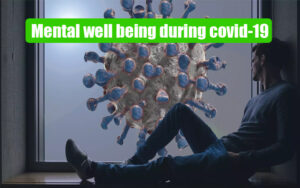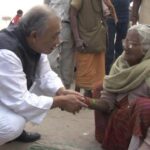Tackling the health issues brought about by the stresses of Covid-19 is of utmost important. Maintaining a cool head and a stress-free attitude not only keeps us healthy but also helps us tackle the problems posed by the pandemic in a more effective manner.
The world has come under the radar of covid-19, along with the restrictions that follow, every aspect of human life has been affected. Covid-19 presents itself in many stress-inducing situations such as the death of loved ones, separation from friends and family via social distancing, financial and occupational struggles, exercising judgement, and the health risks posed by the virus. It is of utmost importance that we prioritise our mental health just as much as we do our physical health.


Loneliness and depression:
The virus demands people to practice social distancing and avoid going out unless it’s of absolute necessity. And with that comes, loneliness and depression. According to research, psychologists in the field of psychoneuroimmunology voice that the state of mind affects one’s mental health. During times like these, when one is expected to have a strong immunity, which is getting compromised. Doctors recommend home workouts, however, there is a lack of motivation to carry out any such physical activity. People often end up staring at their screens for hours in end, be it either for work, school or entertainment purposes. Young adults have complained about burn-out along with irregular sleep schedules.
There have been lab studies that stressed people for a few minutes which showed bursts of one type of “first responder” activity mixed along with other signs of deterioration. All facets of immunity go downhill when exposed to stress for a period of time- i.e from a few days, months or years. As a result of too much wear and tear, long-term or chronic stress may wreak havoc on the immune system.
Stresses can lead to unhealthy habits:
Coping with stress can involve other unhealthy habits, lifestyles and substance abuse. Asthma and chronic inflammatory lung diseases are categorised by recurrent breathing problems caused by changes in weather, pollution, dust, insecticides and heavy smoking. Some individuals may have breathing issues due to emotional factors and hormonal issues. Those with a weakened psyche are most at risk of contracting the virus. The stresses of the pandemic can lead many to turn to unhealthy recreational activities that leave them weakened and prone to illnesses. It is important to maintain good habits during the pandemic so as to avoid such asthmatic problems.
The majority of people over the age of 60 have hypertension, and it’s been proposed that they’re more vulnerable to COVID-19’s impact. People with high blood pressure and other health conditions are more susceptible to coronavirus because their immune systems are weakened. Long-term health problems and ageing weaken the immune system, making them less likely to combat the virus. High blood pressure affects almost two-thirds of people over the age of 60. The most important thing one can do if they have high blood pressure is stick to the recovery plan recommended by their doctor.
Medication and lifestyle changes can help
Medication and lifestyle changes such as; choosing healthy heart food, avoiding alcohol/smoking, decreasing salt intake in food, managing stress, etc. can help one protect themselves from serious health issues especially during this time of covid-19. Many COVID-19 survivors, according to an increasing number of reports, suffer from heart damage, even though they don’t have underlying heart disease or aren’t ill enough to be hospitalised. Health experts are concerned about a possible rise in heart disease as a result of this new twist. Hypertension acts as a catalyst, increasing the likelihood of cardiovascular disease.
Dr. Gregg Fonarow, chief of the division of cardiology at the University of California, Los Angeles said that Complications like myocarditis, a heart muscle inflammation, may lead to a rise in heart failure in the future. He’s also worried about people with pre-existing heart disease who don’t have COVID-19 but stop going to the hospital because they’re afraid of contracting the virus. Cardiovascular complications have been diagnosed in nearly one-fourth of those hospitalised with COVID-19, and have been linked to about 40% of all COVID-19-related deaths.
A peptic ulcer is a sore on the lining of the stomach, digestive tracts and the mouth that can be caused due to unhealthy eating habits, smoking, drinking alcohol, stressful events, compromised sleep schedules, and a lack of physical exercise. In many cases, ulcers cause a burning pain on the upper parts of the abdomen that require physical treatment. Apart from seeking medical consultation, the individual must maintain a relaxed state of mind, should attempt to mediate their work habits as it is important to work in a tension-free environment.
The maintenance of a healthy diet can also prevent high glucose levels and diabetic tendencies that arise due to irregular eating and other unhealthy coping mechanisms. Maintaining a cool head and a stress-free attitude not only keeps us healthy but also helps us tackle the problems posed by the pandemic in a more effective manner. It is important to prioritise our mental health and remain calm during these troubling times. And this too shall pass.


Shubhra Vinod and Roshan Yohann Anand
Undergrad students from CHRIST (Deemed to be University)
Under the guidance of;
Dr. K. Jayasankara Reddy
Professor, Department of Psychology
CHRIST (Deemed to be University)
Hosur Road, Bangalore – 560 032
References
1. Stress Weakens the Immune System. (2006, February 23). Apa.Org. https://www.apa.org/research/action/immune
2. Clark, C. E. (2021, January 22). COVID-19 and hypertension: risks and management. A scientific statement on behalf of the British and Irish Hypertension Society. Journal of Human Hypertension. https://www.nature.com/articles/s41371-020-00451-x
3. Marshall, W. F. (2020, June 30). COVID-19 and high blood pressure: Am I at risk? Mayo Clinic. https://www.mayoclinic.org/diseases-conditions/coronavirus/expert-answers/coronavirus-high-blood-pressure/faq-20487663
4. Williamson, L. (2020, September 3). What COVID-19 is doing to the heart, even after recovery. Www.Heart.Org. https://www.heart.org/en/news/2020/09/03/what-covid-19-is-doing-to-the-heart-even-after-recovery
5. Baron, R. A., & Misra, G. (2001). PSYCHOLOGY Indian subcontinent Edition (Fifth Edition). Pearson.











